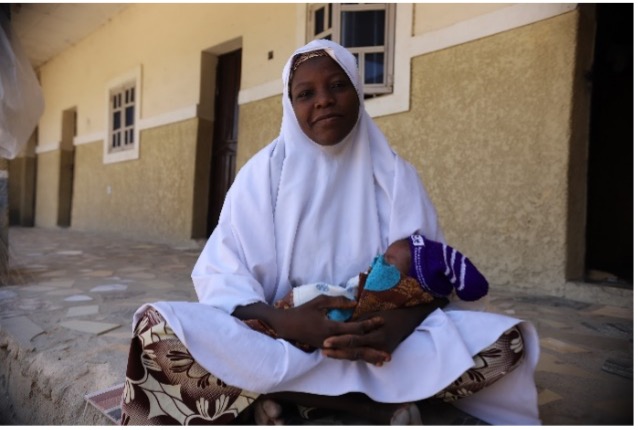Strengthening Health System to Meet the needs of IDPs
AN MMC-JERE SUCCESS STORY
As the humanitarian crisis in northeast Nigeria enters its 14th year, the health sector remains the most affected. Destroyed structures, limited human resources, and limited medical consumables and supplies contribute to a challenging environment for the functioning of and access to health services.
Women of reproductive age face a higher risk of complications, leading to maternal and child mortality due to limited access to antenatal and postnatal care caused by the disruption of health services.
Fatima is a 37-year-old IDP from Baga, residing in the Mashidami area of the MMC local government in Borno State. Married for 15 years, Fatima has repeatedly experienced the loss of pregnancies due to inadequate medical care.
“I have been married for 15 years, and during this period I experienced four miscarriages and two stillbirths. I was living in Baga before we forcefully relocated due to the insurgency. I usually have complicated pregnancies but accessing health care to help me deliver safely has always been a challenge.”
Fatima’s frustration grew because of the regular loss of her children and the cultural context she is from- a marriage is deemed successful when a couple bears children. This affected the health system because the armed conflict contributed to her inaccessibility to proper medical care while pregnant.
In 2022, Fatima took in again, and through her niece she got to hear about FHI 360’s supported primary health care, where free health services including ante-natal care are provided. As she began experiencing labor, she was rushed to the PHC where she was admitted. Fatima narrates her experience:
“My brother’s daughter told me about the Herwa facility because she lives around there and has benefitted from the free health services provided. So, I began visiting the primary health care and when I was in labor overnight; my childbirth experience is usually difficult when there was no progress, the team transferred me to the teaching hospital where I had a cesarean section.

While at the hospital, Fatima received free health care before, during, and after childbirth. Her son is now one month old, and she still takes him to the facility for immunization.
FHI 360 with support from USAID, is providing a health system strengthening intervention across three government primary health care facilities in MMC and Jere local government areas of Borno State. FHI 360 is working in collaboration with the State Ministry of Health and the State Primary Health Care Development Agency to ensure available health facilities can deliver affordable, accessible, and quality health care to the people.
So far, FHI 360 has supported the referral of 232 patients with cases such as obstetric and gynecological emergencies, Hepatitis B, and severe malaria with complications to the University of Maiduguri Teaching Hospital through an MoU and other relevant health organizations. Through this referral system, beneficiaries will have access to affordable high-quality care.


